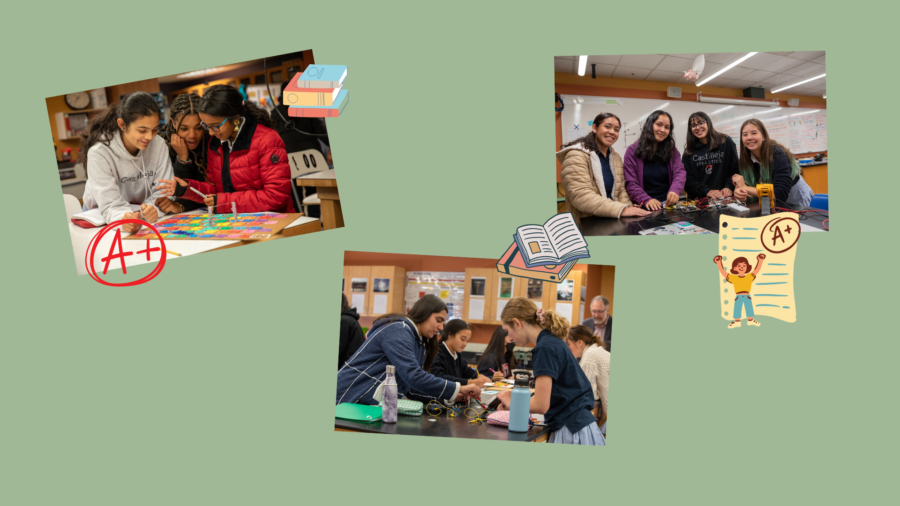The origins of Castilleja’s competitive culture
Castilleja: competitive or cooperative?
It’s not unexpected that Castilleja would have a competitive culture. It is ranked as the number two all-girls high school in the United States, according to (dubiously reliable) Niche.com. Some could even argue that Castilleja’s competitiveness begins even before the start of sixth grade. With only around 60 spots available per year and hundreds of girls applying, there is inevitably an innate pressure to succeed and achieve.
When asked if she thought Castilleja was competitive, Ameena Haque, class of 2026, answered, “Yes 100 percent. Without a doubt.” However, she didn’t talk about any policies Castilleja itself has. Instead, she touched on the less obvious feelings the environment creates. In my interview with her, she emphasized that a big part of this feeling of competitiveness in the community is from the people Castilleja attracts. Haque says, “These students want to do their best and you know that really does lead to comparing yourself to other people and can create a toxic mindset on your work and your worth, especially when your worth starts to become measured off of your grades.”
Through my interviews, a common theme I noticed was grade comparing. Haque said that if you hear another person’s grade and it’s better than yours, it makes you feel like you need to be better and get a higher grade next time. Another layer to this, she mentioned, is that even bigger than competitiveness with other people is competitiveness with yourself. “When you raise such a high bar for yourself, you fall down an endless rabbit hole of ‘I need to do better’ even if you’re already doing well.”
But can this comparison be beneficial? When talking to a fellow classmate, she detailed the competition she had throughout eighth grade with another student to see who could finish with the best grade in Chinese class. Regardless of how healthy this was, there’s no doubt that it motivated them to work incredibly hard, as one of them finished with a 99% and the other with a 98.5% (tears were shed).
Nonetheless, this driven, and sometimes cutthroat, culture isn’t always very evident. In middle school, Castilleja focuses less on academics and more on being engaged, focused, and creating a supportive environment. However, Michelle Leonard, class of 2024 said that in high school, people start stressing more about doing well in school and college preparation, but it’s all “bubbling under the surface.”
She talked about the implicit vs. explicit values and “rules” she feels in Upper School. “It feels stressful when everyone seems like they are worrying about school but you’re not allowed to talk about it. I guess it feels taboo, and I’m especially thinking about college apps when I say this, to talk about what you’re planning about or when you’re taking certain tests and certainly how you did on those tests. I think everyone is super driven to do well and wants to know how they compare to classmates, but it’s been drilled into us that it isn’t acceptable to be completely transparent about your academics.”
To Leonard, Castilleja doesn’t have this intense competitive culture that people associate with it. Instead, she finds an undercurrent of rules to not be straightforward with your standings in classes, and pretending that everything is going well because, at a school like Castilleja, the expectation is that everyone is succeeding.
Is this unique to Casti and is that part of the appeal of the school? I spoke to new nine, Violet Yick, who said her middle school wasn’t that competitive, so she enjoys the opposite at Casti. She said, “It’s nice to know that other people actually care, too.”
On the contrary, Zoe Frank, class of 2026 said the transition from a much less competitive school can be a cause for stress. “There was of course competition [at my old school] but a B wasn’t the end of the world, and kids wouldn’t complain as much about an A-” At Casti, there is a feeling of needing to go above the standard others have set for you, whether you do that by competing with others or yourself.
Ash Ehrenpreis, class of 2023, stated a similar sentiment to Yick, saying that her younger brother went to public school for middle school and part of high school and observed a culture of “it’s cool to not be into academics.” She said that she doesn’t think that Castilleja is that much more competitive than other schools, instead, people are just more motivated to learn. Furthermore, she said that Castilleja is really only as competitive as you make it, depending on your friends and their mindsets. “I want to foster my personal growth and learning at the highest possible level, but I don’t want to do it at the expense of someone else’s growth.”
Piper Lyons and Fiona Brooks, class of 2023, both expressed that, like Ehrenpreis, they found that you can choose to dissociate from the competitiveness as Casti. However, they said they definitely notice it, predominately on the STEM side. Brooks explained that science and math are inherently competitive fields. STEM classes are mostly graded on a curve in college, and while these classes do require collaboration, curves have generally been thought to breed unnecessary competition as only a certain amount of students can attain the top grade. Additionally, at Castilleja, only STEM subjects offer extended classes in freshman and sophomore years, which could be part of the reason both Brooks and Lyons see and have experienced added pressure in STEM classes. “The competition can be nice, especially with yourself,” Brooks said, as she feels it’s preparing and motivating her to work hard, largely for when she gets to college and pursues a STEM-based career.
Elise Wong-McBride, class of 2026 shared with me, “I personally enjoy competitive culture, as it motivates me to do well, but I realize that it can be detrimental at times. I think it can be motivational and fun until it gets too serious and everyone just feels bad about themselves.”
Wong-McBride’s statement is the sentiment most people at Castilleja feel. Sometimes it’s nice to have competitiveness to push you to work harder, like my classmates with their Chinese class competition, but other times it can lead to what Haque and Leonard talked about, where grades are compared and it feels like honest transparency is lacking.
While all this is true, Castilleja makes up for its aggressively driven culture by also being incredibly and uniquely supportive. Vienna Farano, class of 2026 said it best, “I know that everyone here truly does want their classmates to succeed, and if I need help on an assignment or studying for a test, my classmates will always be there for me.”

Zoë Friedman '26 is an Editor-in-Chief for Counterpoint. In addition to writing, she enjoys playing lacrosse, all things music, and spending time outdoors...

Thea Louise Dai '24 is an Editor-in-Chief of Counterpoint. For her fourth year writing for the paper, she hopes to impact the Castilleja community by telling...


